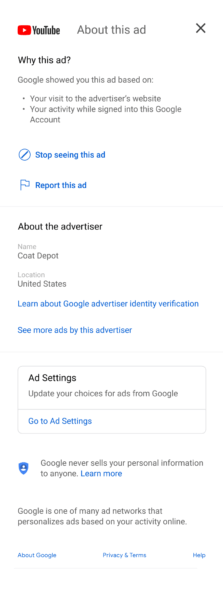“To give users of our products even more transparency, we are enhancing ad disclosures with
new advertiser pages. Users can access these disclosures in our new ‘About this ad’ menu to
see the ads a specific verified advertiser has run over the past 30 days,” said Google in an announcement today.
As part of the company’s advertiser transparency initiative, Google Ads introduced their advertiser identity verification program as well as their “About this ad” information this past year. The new Advertiser Page program takes that transparency for searchers to the next level.

Users can learn more about advertisers and report ad policy violations. “This transparency helps users learn more about the company behind a specific ad. It also helps differentiate credible advertisers in the ecosystem, while limiting the ability of bad actors to misrepresent themselves,” according to the announcement blog. Searchers can report any ad policy violations they believe an ad is breaching. From there a Google team member reviews it and takes the ad down if the violations are found to be true.
What type of advertiser info is displayed? “[The advertiser page] will be generated based on the approved ads running and the information in their account. In terms of information about the advertiser, we will continue to show the advertiser’s name and location,” a Google representative told us.
>> Read more: Three strikes, you’re out: Google’s new ad policy violations pilot
YouTube has highest ad control adoption. “Users engage with our ads transparency and control tools on YouTube more than any other Google product,” added the announcement. As such, Google Ads will be rolling out the “About this ad” option for YouTube and Search in the coming months, as well.
Why we care. The advertiser page gives PPC experts the opportunity to show the integrity of their advertising to users but also leaves a trail of previous advertisements. This will hopefully help keep advertisers in compliance with Google’s ad policies and may be thinking about how their ad history affects any current ads. It seems like there might be an opportunity for competitors to report ad violations (how would consumers know what violates Google’s ads policies?), but that seems like a super niche use case for this feature.
New on Search Engine Land
http://feeds.searchengineland.com/~r/searchengineland/~3/EGTZ30ogb5g/about-this-advertiser-initiative-now-includes-advertisers-pages-for-google-ads-374636


